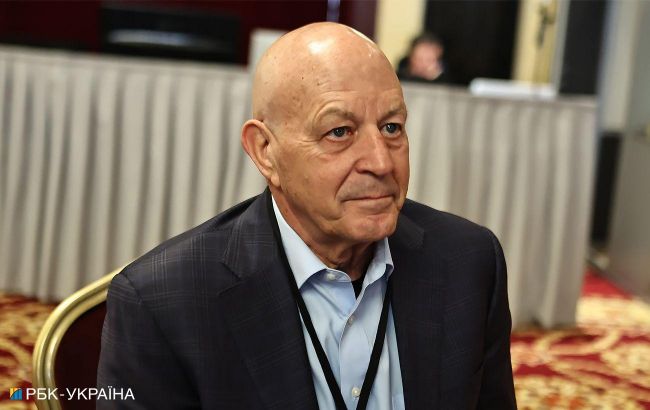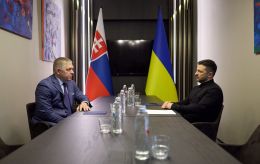US Vice Admiral, Mike LeFever: 'For Russia, Ukraine is just first step of many'
 Vice Admiral (Ret.) Mike LeFever, US Navy, (photo: RBC-Ukraine)
Vice Admiral (Ret.) Mike LeFever, US Navy, (photo: RBC-Ukraine)
Vice Admiral (Ret.) Mike LeFever, US Navy, in a blitz interview with RBC-Ukraine, discussed attacks on Russian nuclear power plants, Ukraine's chances of seizing the initiative in the war, the sentiments of ordinary Americans and Putin's plans.
Over the past months, Western media have published numerous forecasts depicting extremely grim prospects for Ukraine in the war. The main reason cited is the prolonged delay in receiving assistance from the US. Quite unexpectedly, the six-month saga surrounding this aid allocation sharply intensified this week, and a positive decision from the US House of Representatives is expected as soon as tomorrow, April 20.
Mike LeFever, a retired US Vice Admiral with nearly 40 years of military service and former commander of US forces in Pakistan, shared his insights with RBC-Ukraine in the corridors of the Cipher Brief's Kyiv Economic and Security Forum even before the story of aid to Ukraine reached its climax. However, even then, LeFever radiated optimism regarding Ukraine's prospects in the war, emphasizing the importance of his country providing assistance as quickly as possible.
- President Zelenskyy confirmed that the United States is dissatisfied with the Ukrainian attacks on Russian energy infrastructure. Americans are known to have asked our authorities to stop doing this. How do you assess such a US position?
I think one of the issues is that, from a policy standpoint, the government is considering a very difficult policy of trying not to escalate the war.
I think from a military standpoint, it is unsound, not valid that we should be eliminating Ukraine's idea, their campaign of how they expect to be able to defeat Russia. When Russia is able to attack them freely from their soil, but they are not allowed to attack back, (it) restricts them considerably from preventing that.
- Generally, how do you assess the chances of Ukraine taking over the initiative in this war, maybe this year or next year, is it possible?
- Yeah, I do believe it. I was struck with the resolve, the resiliency, and the pride of the Ukrainians. And so I think providing Ukraine, that's why this aid package is so important, to be able to have at least the capacity and means to be able to take the fight. We have seen great resolve over the last two years and it's tiring, a long war is very tiring. So, it is important to be able to give them the assets they need to be able to dictate the terms in which they can fight.
How do you assess Western society's sentiment regarding the so-called "freezing of the war," "making a compromise or something like that"?
- The disinformation campaign that the Russians are conducting is really quite bold. And it has convinced some of the folks who have not done a real understanding of the truth and critical thinking about what's going on. This is a strategic moment in time to be able to support Ukraine and to demonstrate to Russia that we're not going to allow them to take over Crimea and the whole of Ukraine.
- Western media have published many pessimistic forecasts for Ukraine, saying that Ukraine will definitely fail without US aid. Do you agree with that, and could Europe somehow replace America in that role, maybe after the presidential elections in the US?
I'm an optimist by design, so I don't believe in defeatists. After talking with your leadership here, I can see that there is no defeatist whatsoever. It is about winning and about the freedom of Ukraine, which I think is incredible.
We should all be clear-eyed that Russia means Ukraine is just the first step of many. You're watching the shenanigans of them and around the Baltics, around Belarus, around Moldova. They are just walking this path through recreating what Putin thinks is the atmosphere that "great Russia" was some years ago when he started comparing himself to the great czar. So, for us not to be naive about the idea of what his means are and how important this aid package is to be able to support Ukraine is, I think, very critical.
- Do you think your fellow Americans, ordinary citizens, understand the need to spend some more billions for Ukraine instead of investing them in schools and roads somewhere in Arizona, for example?
- I am not sure all of them do. That's the scary part. However, when you see some of the reporting, the support of Ukraine is well over 50%, around 60%. I don't recall what the last numbers were, but most people are in favor of Ukraine's aid to prevent this atrocity from happening from the Russians. In America, there is this isolationist feeling in this populist movement, and people are building on that.
Some of them are also listening to the Russian disinformation about the idea that if they don't spend this money here, it will enhance their school or whatever. It is the amount of money in the bucket for freedom and security and to still demonstrate that the US is a powerhouse in the world and a world leader and we need to step up to that challenge to prevent this from going on. And so putting it in perspective of how little that money is to what an incredible cause, a strategic element, and a strategic achievement is so critical. And I think it's us trying to describe that and educate the American public on how important this is: being here to see this, to see the situation on the ground, the drive and the power of the Ukrainian people, is so valuable and we hope to carry that message back and be able to spread it.
- Should we expect a dramatic change in the US policy towards Ukraine if there is a change of power in the White House?
- I don't think so. Because I think most people realize the incredible impact of what it means to NATO and our allies and what our role in the world is. Hopefully, as the election comes around and these major issues are put on the floor, people will understand and make the right choice.

